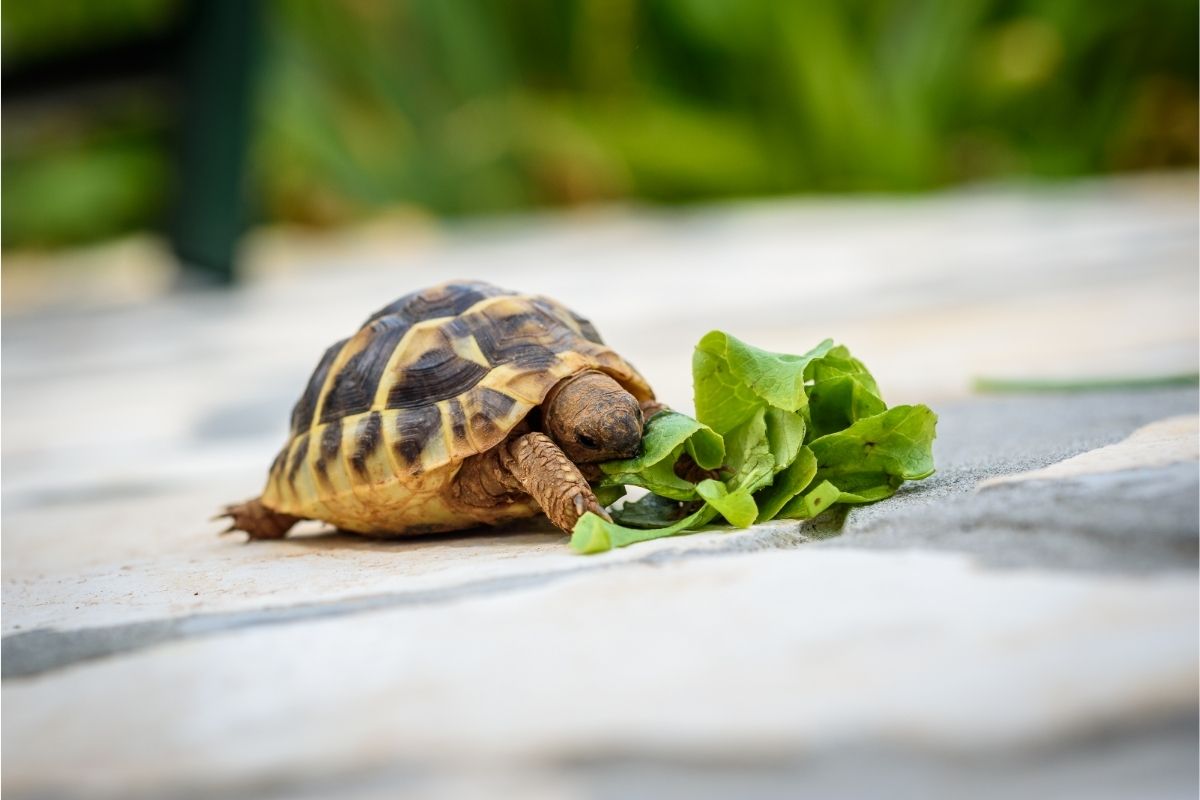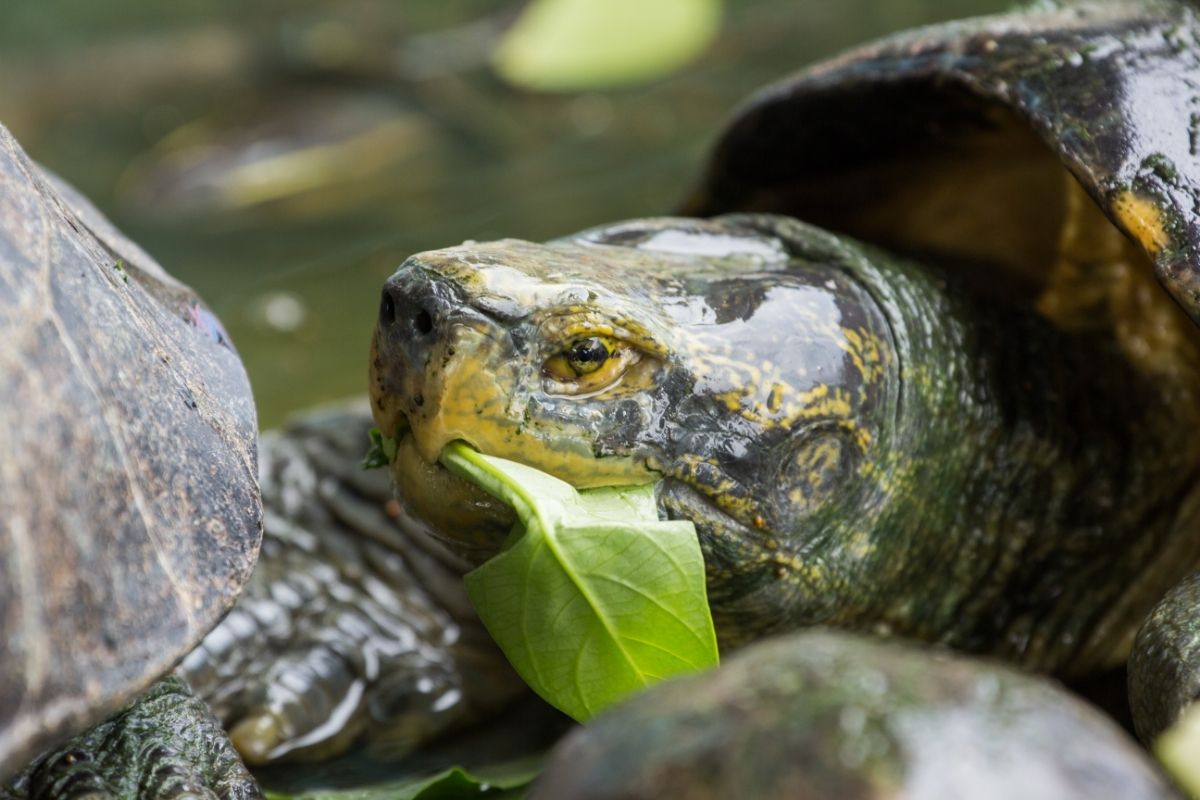Every pet owner wants to make their pet happy and healthy, and one way to do that is by bringing some variety to their diet.
It’s the same with pet reptiles like turtles, tortoises, and even terrapins – owners want to shake things up now and then by feeding their pets something different to keep their lives enriched and their minds stimulated.
Feeding them a different food now and then is a great way to do this, but it does come with a few risks.

There is always some kind of food that is deadly to a certain type of animal. Dogs can’t have chocolate, rhubarb is toxic to rabbits – and so you need to research thoroughly what foods you can and cannot give to your pet under any circumstances.
If you are thinking of treating your pet reptile to some spinach, then keep on reading here to find out if that is a good idea or not. We are going to be taking a closer look at spinach and if it is recommended to feed it to your pet turtle, tortoise, or terrapin.
So, let’s jump in!
What Is Spinach?
Spinach is a leafy green vegetable that has been around for thousands of years. It was first cultivated in ancient China and later spread throughout Europe and Asia. Today, we know it as an important part of many diets because of its high nutritional value.
The leaves of the plant contain nutrients such as iron, calcium, vitamins, potassium, and magnesium.
This makes spinach a highly advantageous food to include in your diet as it is great for building healthy bones, improving the quality of your skin and hair, helps lower your chances of developing cancer, and helps manage diabetes.
This means that many people love to include spinach as much as possible in their diet due to its many nutritional and health benefits.
However, these positive effects are all seen in humans – so is the effect of eating spinach the same when it comes to animals like turtles, tortoises and terrapins?
Can Turtles Eat Spinach?
Turtles eat a lot of different types of food, including fruits, vegetables, and leafy greens.
Because it is recommended to include greens like kale, collard, mustard greens, and dandelion greens in a turtle’s diet, a lot of turtle owners naturally assume that you can also feed turtles spinach too.
After all, it is a dark leafy green that shares a lot of similarities with the above listed greens that are already recommended to be a part of a turtle’s diet – so where’s the harm?
The truth is that spinach is actually one of the few foods that you should not give to your turtle.
Although there are many benefits to eating spinach, it has one drawback that makes it completely unsuitable for turtles to eat as part of their regular diet – oxalate and oxalic acid.
Oxalic acid makes absorbing calcium difficult and this means that your turtle will not be having the correct levels of calcium it needs to thrive.
Oxalic acid works by binding oxalate to the intestines which block the space needed for calcium to be absorbed so it can work its magic and your turtle can feel its benefits.
Without calcium, your turtle’s bones can become soft and malformed, and its shell will also not be strong or sturdy. Not only that, but your turtle’s heart, muscles and nerves will also be affected and not be able to function properly.
This will then lead to a condition called metabolic bone disease (or MBD for short) and this condition is fatal in turtles.
So, feeding your turtle spinach regularly can lead to calcium deficiency and related illnesses. Although your turtle will happily munch down a bit of spinach if you offer it to it and your turtle will not be immediately ill, the long-term effects of constantly feeding your turtle spinach will soon become evident.
You can feed your turtle spinach sparingly but the risks of feeding them spinach is so high that many vets would recommend that you avoid feeding your turtle spinach altogether.
The benefits do not outweigh the negatives in this case, even if you try to make up for this by sprinkling your turtle’s food with calcium powder to try and boost its calcium intake.
And so, we would recommend that you do not feed your turtle spinach.
Can Tortoises Eat Spinach?
Again, no – it is not recommended that you feed your tortoise spinach.
As mentioned before, spinach contains oxalic acid which binds to the intestine and prevents calcium from being absorbed. If your tortoise eats a large amount of spinach, it could cause problems with digestion and absorption of other nutrients.
It will then suffer from similar conditions and experience the same negative effects of having malformed bones, a soft shell, and heart trouble.
Although spinach is not the only dark leafy green to contain oxalic acid, it is the one with the highest amount of oxalate. This means that while you can include other foods like kale into your tortoise’s diet, it is still recommended that you feed it sparingly to prevent such effects.
Spinach, however, is high in oxalic acid and this makes it a far more risky food to feed your tortoise.
So, if you want to feed your tortoise a similar but less risky food than spinach, something like kale is a good alternative.
You can also sprinkle the kale with calcium powder to help with your tortoise’s calcium intake, but feeding your tortoise kale now and again will allow it to feel all its benefits without exposing it to the negatives.
Spinach, however, is definitely not recommended as a regular food source for tortoises.

Can Terrapins Eat Spinach?
Terrapins are interesting because their diets vary quite a bit from their turtle and tortoise cousins. Terrapins eat meats like pork, chicken, worms, snails, fish, fruits and vegetables.
Their omnivorous diet is definitely more varied but does this mean that they can eat spinach while turtles and tortoises cannot?
Nope, we would still not recommend that you feed your terrapin spinach.
Again, spinach is high in oxalate which greatly affects bone and shell strength along with a few other negatives. This still impacts terrapins just as much as it impacts turtles and tortoises, so it’s definitely a bad idea to try and feed your terrapin spinach regularly.
Also, a terrapin’s diet is mainly made up of meat so trying to substitute that with plants is not a good idea anyway. Terrapins should mainly eat meat with a dash of vegetables and plants on the side for variety and nutrients, but it is not enough to sustain their whole diet.
So, while munching on a bit of spinach once will not kill your terrapin, it will definitely feel its negative effects in the long run if you add it to its daily diet.
Conclusion
Spinach is a great addition to our human diets but the same can’t be said for creatures like turtles, tortoises, and terrapins. While we can handle the negative effects of spinach more easily, animals like turtles, tortoises, and terrapins cannot.
This is because they rely heavily on their shells and bones to keep them safe and protected. Plus, a happy shell is a key to their happiness in general and if their shells are soft or fragile, the creature will only be in a lot of pain and under stress.
So, it’s important for owners to keep their pet’s shells strong and healthy. Spinach actively works against this so for the better health of your tortoise, turtle or terrapin, ditch the spinach for some less risky leafy greens instead.
This way you can keep your pet’s diet varied while keeping them in the best health possible!
